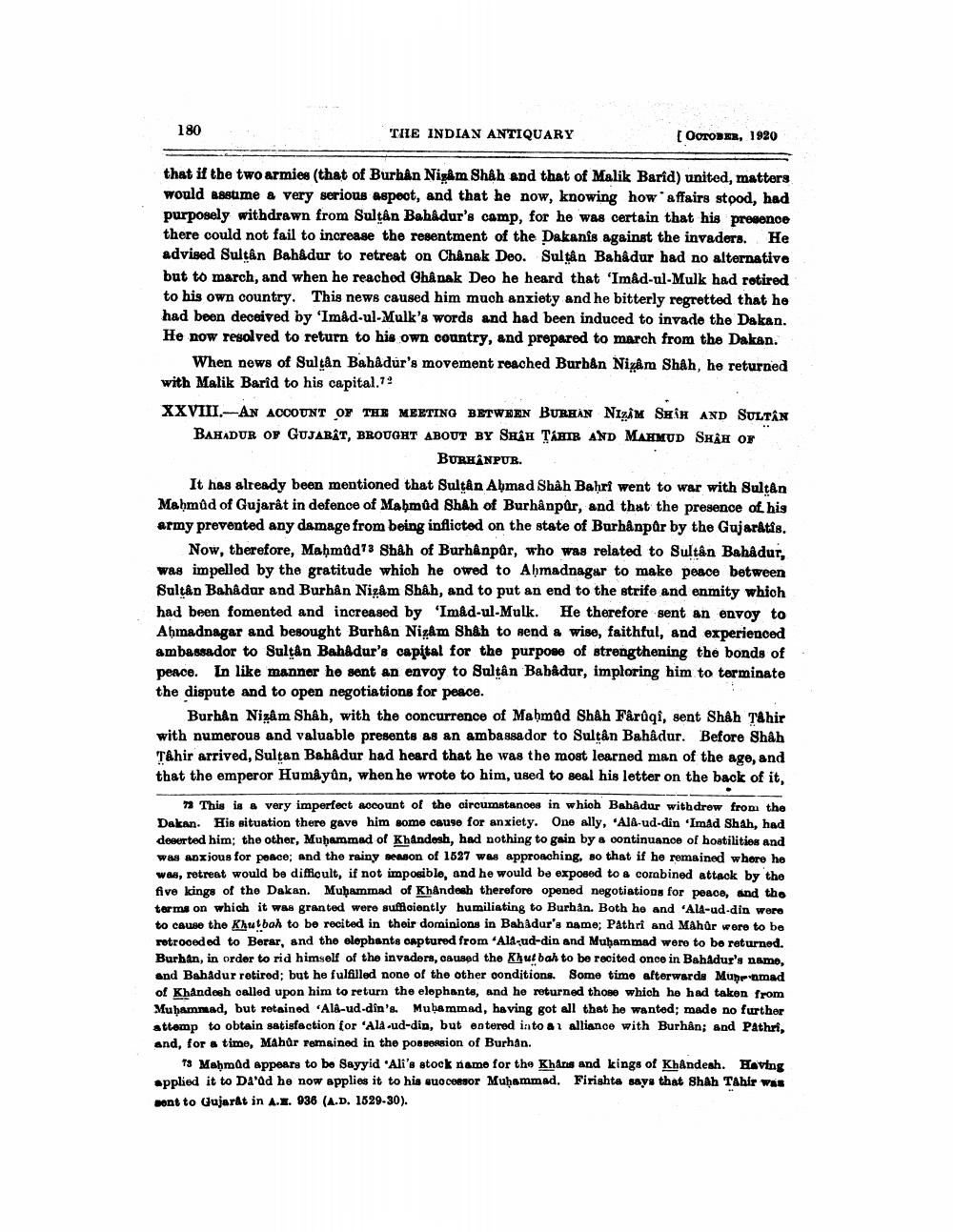________________
180
THE INDIAN ANTIQUARY
OOTOBER, 1920
that if the two armies (that of Burhan Nigam Shah and that of Malik Barid) united, matters would assume a very serious aspoot, and that he now, knowing how affairs stood, had purposely withdrawn from Sultan Bahadur's camp, for he was certain that his pregence there could not fail to increase the resentment of the Dakanis against the invaders. He advised Sultan Bahadur to retreat on Chênak Deo. Sultan Bahadur had no alternativo but to march, and when he reached Chånak Deo he heard that 'Imad-ul-Mulk had retired to his own country. This news caused him much anxiety and he bitterly regretted that he had been deceived by 'Imad-ul-Mulk's words and had been induced to invade the Dakan. He now resolved to return to his own country, and prepared to march from the Dakan.
When news of Sultan Bahadur's movement reached Burban Nizam Shah, he returned with Malik Barid to his capital.?? XXVIII.-AN ACCOUNT OF THE MEETING BETWEEN BURHAN NIZÂM SHIH AND SULTÂN BAHADUR OF GUJARAT, BROUGHT ABOUT BY SHu TAHIB AND MAHMUD SHH Or
BURHANPUR. It has already been mentioned that Sultan Abmad Shah Bahri went to war with Sultan Mahmûd of Gujarât in defence of Mahmud Shah of Burhanpur, and that the presence of his army prevented any damage from being inflicted on the state of Burhanpår by the Gujaratis.
Now, therefore, MahmûdShâh of Burhênpûr, who was related to Sultân Bahadur, was impelled by the gratitude which he owed to Ahmadnagar to make peace between Bultan Bahadur and Burhan Nigam Shah, and to put an end to the strife and enmity which had been fomented and increased by 'Imad-ul-Mulk. He therefore sent an envoy to Ahmadnagar and besought Burhan Nizam Shah to send a wise, faithful, and experienced ambassador to Sultan Bahadur's capital for the purpose of strengthening the bonds of peace. In like manner he sent an envoy to Sultân Babådur, imploring him to terminate the dispute and to open negotiations for peace.
Burhan Nizam Shah, with the concurrence of Mahmud Shah Fârûgi, sent Shah Tahir with numerous and valuable presents as an ambassador to Sultân Bahadur. Before Shah T&hir arrived, Sultan Bahadur had heard that he was the most learned man of the age, and that the emperor Humayun, when he wrote to him, used to seal his letter on the back of it,
This is a very imperfect account of the circumstances in whioh Bahadur withdrew from the Dakan. His situation there gave him some cause for anxiety. Ono ally, 'All-ud-din 'Imad Shah, had desorted him; the other, Muhammad of Khandesh, had nothing to gain by a continuanoe of hostilities and WAS anxious for peace; and the rainy son of 1527 was approaching, so that if he remained where he WA, retreat would be difficult, if not imposible, and he would be exposed to a corabined attack by the five kings of the Dakan. Muḥammad of Khandesh therefore opened negotiations for peace, and tho terms on which it was granted were sufficiently humiliating to Burhan. Both ho and 'Ald-ud-din were to cowo tho Khutbah to be recited in their dominions in Bahadur's name; Pathri and MAhûr were to be retroceded to Berar, and the elephants captured from 'Ala-ud-din and Muhammad were to be returned. Burhan, in order to rid himself of the invaders, caused the Khutbah to be recited once in Bahadur's name, and Bahadur retired; but he fulfilled none of the other conditions. Some time afterwards Mudramad of Khandesh called upon him to return the elephants, and he returned those which he had takon from Mubammad, but retained AIA-ud-din's Muhammad, having got all that he wanted; made no further attemp to obtain satisfaction for 'All-ud-din, but entered into a 1 alliance with Burhan; and Pathri, and, for a time, Mahar remained in the possosion of Burhan.
13 Mahmad appears to be Sayyid Ali's stock name for the Khare and kings of Khandesh. Having applied it to Da'ad he now applies it to his successor Muhammad. Firishta says that Shah Tahir was pont to Gujarkt in A.x. 936 (A.D. 1629-30).




